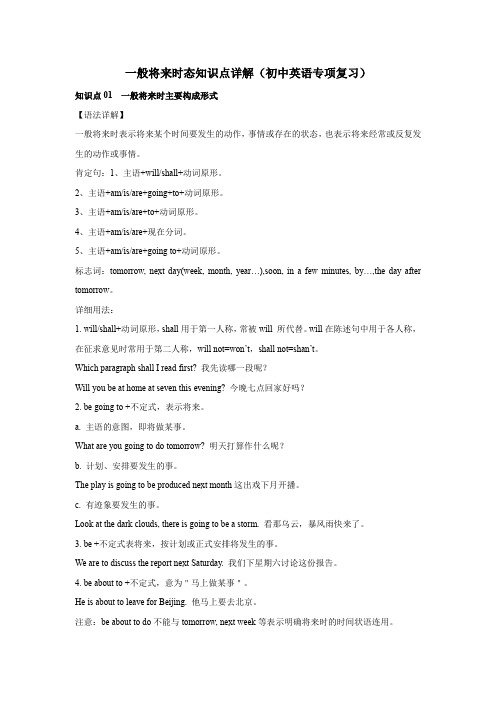时态复习 一般将来时
英语时态一般将来时知识清单总结及用法

英语时态一般将来时知识清单总结及用法1、一般将来时的结构2、一般将来时的结构变化3、知识要点一般将来时的用法(1) 表示将来的动作或状态,常与tomorrow,this evening. next Monday (week,month,year,in ten minutes,someday,in 2018,in the future 等单词或短语连用。
如:They say that the weather will be good tomorrow. 据说明天是好天气。
I shall have supper soon. 我要吃晚饭了。
There will be a class meeting this afternoon. 今天下午开班会。
He will come to see you next Monday . 他下周一会来看你。
(2) 表示即将发生的或最近打算进行的事,常用“be going to+动词原形”。
如:How are you going to spend your holiday ? 你们打算怎样度假?(3) 表示按计划即将发生的动作,常用go,come,start,move,leave等动词的进行时态。
如:He is coming in a minute . 他很快就来。
(4) 表示按计划要发生的事或征求对方意见,或表示安排、命令、预定好要做的事情,常用“be to+动词原形”。
如:The concert is to take place on Friday evening . 音乐会要在下星期五举行。
(5)表示即将发生的动作,或者表示立刻要做的事情,近在眼前的将来,常用“be about to+动词原形”。
如:Hurry up! The train is about to leave . 快点!火车马上要开了○(6) 一般将来时中be going to结构与will的异同点:①be going to结构和will的相同点:都表示将来的动作或状态。
中考英语语法复习课件一般将来时

否定句:主语 + be动词+ not +going to+动原+其它. • Look at the sunshine. There is not going to be rain. 看那阳光
,这将不会下雨。 • They aren't going to have an English test next week.他们下周
Tomorrow. 明天。
一般将来时态的结构: 第2类:be going to + 动原 肯定句:主语 + be动词 + going to + 动原+其它. • He is going to spend his holidays in London. 他打算在伦敦度
假。 • They are going to have an English test next week.他们下周有
英语考试吗?
特殊疑问句:特殊疑问词+ be动词 + 主语 +going to+动原+其 它? • What are you going to do tomorrow?明天你打算作什么? • What are they going to do next week?他们下周将去做什么?
一般将来时态的结构: 第3类:现在进行时表将来 (1)come, go, arrive, leave, start, begin, return等瞬时位移动词 的一般现在时可以表示将来含义,主要用来表示在时间上已确 定或安排好的事情。这类情况主要用于表示按照计划或安排将 要发生的动作或事件,常表示最近或较近的将来,有“意图”、“ 安排”或“打算”,常用肯定句,如come,go, leave等。 • The train leaves at six tomorrow morning. 火车明天上午六点
一般将来时态

this evening
What is the mouse going to do this evening? It is going to do its homework.
will
What is she going to do? She’s going to shop/ go shopping...
They are going to dance.
will
What are they going to do this evening? They are going to watch TV.
will
句式的变化规则:
1.变否定句—---在be/will后加not 。 2.变一般疑问句------将be/will动词提前。 (主语是第一人称I 时,变一般疑问句 时将I 变you) 3.特殊疑问句(也就是对划线部分提问) -----要用特殊疑问词what +一般疑问句。
表示“不肯”、“不能”等: e.g. We asked her to be the director but she won’t agree. Oil and water won’t mix. The car won’t start.
可表示未来情况的还有:
be going to 结构 现在进行时 一般现在时 be about to 结构 be + 不定式结构
系动词am,is,are的原形都是 。 例如: 系动词 , , 的原形都是be。 例如: 的原形都是 People will have robots in their home. 人们的家中将会有机器人。 人们的家中将会有机器人。 There will be one country in the world. 世界上将会只有一个国家。 世界上将会只有一个国家。 shall适用于第一人称 ,We;而will适用于所有人称。 适用于第一人称I, ; 适用于所有人称。 适用于第一人称 适用于所有人称 通常可以用will来代替 来代替shall。 通常可以用 来代替 。 will,shall均可缩写为:'ll,如: 均可缩写为: , , 均可缩写为 I will= I'll; ; she will = she’ll;will not 和shall not分别可以 ; 分别可以 缩写为 won't 和shan't。 。
最新人教pep版小学英语毕业专项复习——第四部分 时态精析 第四节一般将来时

A. have
B. is having
C. will have
返回目录
( C )5. Oliver: Are you going to the park? Tom: Yes,
_____.
A. he is
B. I will
C. I am
返回目录
三、Ask and answer. 根据答句写问句。 1. A: __W__h_a_t'_s_t_h_e_w__e_a_th_e_r__li_k_e_t_o_m__o_r_ro_w__?__/H__o_w_'_s_t_h_e
返回目录
3. A: __I_s_s_h_e__g_o_in_g__to__c_o_o_k_d__in_n_e_r_?_____ B: Yes,she is going to cook dinner.
4. A: ___W__h__er_e__a_r_e_y_o_u__g_o_in_g_?_________ B: I'm going to Beijing. 5. A: ___W__h_a_t_a_r_e__y_o_u_g_o_i_n_g__to__d_o_?_____
返回目录
二、一般将来时的句型结构 1. be going to结构 (1) 肯定句:主语+be going to+动词原形+其他。 如: I'm going to go fishing this week. 这周我打算去钓鱼。 Tom's father is going to wash the car today. 今天汤姆的爸爸 打算洗车。
返回目录
( A )3. My mother _____ shopping next weekend.
一般将来时态知识点详解(初中英语专项复习) (4)

一般将来时态知识点详解(初中英语专项复习)知识点01 一般将来时主要构成形式【语法详解】一般将来时表示将来某个时间要发生的动作,事情或存在的状态,也表示将来经常或反复发生的动作或事情。
肯定句:1、主语+will/shall+动词原形。
2、主语+am/is/are+going+to+动词原形。
3、主语+am/is/are+to+动词原形。
4、主语+am/is/are+现在分词。
5、主语+am/is/are+going to+动词原形。
标志词:tomorrow, next day(week, month, year…),soon, in a few minutes, by…,the day after tomorrow。
详细用法:1. will/shall+动词原形,shall用于第一人称,常被will 所代替。
will在陈述句中用于各人称,在征求意见时常用于第二人称,will not=won’t,shall not=shan’t。
Which paragraph shall I read first? 我先读哪一段呢?Will you be at home at seven this evening? 今晚七点回家好吗?2. be going to +不定式,表示将来。
a. 主语的意图,即将做某事。
What are you going to do tomorrow? 明天打算作什么呢?b. 计划、安排要发生的事。
The play is going to be produced next month这出戏下月开播。
c. 有迹象要发生的事。
Look at the dark clouds, there is going to be a storm. 看那乌云,暴风雨快来了。
3. be +不定式表将来,按计划或正式安排将发生的事。
We are to discuss the report next Saturday. 我们下星期六讨论这份报告。
一般将来时(9张PPT)初中英语专项复习课件

will句式总结:
肯定
否定
一般疑问
回答
I will have
I won`t have Will I have
Yes,I will.
many presents. many presents. many presents? No,I won`t.
He will travel He won`t travel Will he travel Yes, he will.
to Beijing.
to Beijing.
to Beijing?
No ,he won`t.
There will be fun in Xi`an.
There won`t be Will there be fun in Xi`an. fun in Xi`an.
Yes,there will. No,there won`t.
1、表示将来某一时刻的动作或状态: We will come to see you the day after tomorrow. There will be a wonderful show next week.
2、表示将来某一段时间内经常的动作或状态: The students will come and work in the lab once a week. We will come and work in this factory every year.
Some day people will go to the moon . 否定句:在will 的后面加not即可。will not 可缩写为 won’t
They won’t use books . 一般疑问句:把will 提到句子主语之前,结尾变问号。
英语时态:一般将来时
英语时态:一般将来时一般将来时(simple future tense)表示将来某一时段的动作或状态,或将来某一段时间内经常的动作或状态。
一般将来时常常和表示将来的时间状语连用。
如:tomorrow, next week, in the future, in a year等。
Ⅰ. 句法结构【仅讨论陈述句和疑问句两种语式】:1.陈述句:A. 肯定形式:主语+be going to /will/shall +动词原形+其他B. 否定形式:主语+be not going to /will not/shall not+动词原形+其他注:a. 在直接在助动词后加not。
b. be going to结构中的be仅指am, is, are三个be动词。
c. will/shall+动原结构在谓语两态变化中无人称和数的变化。
d. 一般情况下,仅表示时态时,shall用于第一人称,will用于第二、三人称;表示说话人强烈意愿和语气时则用法相反。
2.疑问句:A. 一般疑问句:助动词提前即可①Be动词+主语+ going to +动词原形+其他②Will/Shall+主语+动词原形+其他B.特殊疑问句:特殊疑问词+一般疑问句(同上)3.被动语态:主语+ 助动词(结构) + be +动词过去分词【被动结构be done,时体现在助动词】➢两态变化例句参考下表(以will为例):Ⅰ. 主要用法及结构:1.【一般将来时表将来】一般将来时表示将要发生的动作或情况。
A.will/shall +动原I will(shall) arrive tomorrow.Will you be free tonight?B.be going to+动原a.表示计划、打算、准备做的事。
We are going to put up a building here.b.表示即将发生或肯定要发生的事。
I think it is going to snow.注:在一般将来时的句子中,有时有表示将来时间的状语,有时没有时间状语,这时要从意思上判断是否指未来的动作或情况。
初中英语语法复习:一般将来时
初中英语语法复习:一般将来时一般将来时表示将来某一时刻的动作或状态,或将来某一段时间内经常的动作或状态。
常与一些表示将来的时间状语连用,如:tomorrow(明天),next week(下周),from now on(从现在开始);in the future(将来),in a few days等。
1、基本结构:be going to+动词原形 2. will+动词原形一般将来时:be going to+动词原形一般将来时:will+动词原形2. will 和be going to 的区别will 和be going to一般可以互用,但有时有区别:1)含时间和条件状语从句,如果主句是将来时,多用will.2)如果不是以人的意愿为转移,将来肯定会发生的动作和状态,多用will3)be going to根据迹象推测,有可能发生的事情或计划要做的事情。
3. there be 句型的一般将来式:1.There is/are going to be 2. There will be一、单项选择1.The old scientist ______ us a talk on future life next week.A.gives B.gave C.will give D.is giving2.—Jim, what are you going to do this weekend?—I ______ a movie with my dad.A.am watching B.watch C.watched D.am going to watch3.—Where’s mum?—She is trying on the new dress upstairs now. She _________ it to a party.A.wears B.wore C.will wear D.is wearing4.—What are you going to do next weekend?—There __________ a basketball match next Sunday. I want to watch it.A.will be B.will have C.is going to have D.are going to be 5.—Which team ________ the football match?—I’m not sure. The two teams both play well. Let’s wait and see.A.wins B.won C.is winning D.will win 6.Robots ________ us do some heavy and difficult jobs in the future.A.help B.helped C.are helping D.will help7.—What are you going to do next weekend, Wang Hui?—I ________ my grandparents next Sunday.A.visit B.visitedC.am visiting D.am going to visit8.I don’t know if it ________ sunny tomorrow. If it ________ sunny, I will go fishing. A.will be; is B.is; will beC.will be; is going to be D.is; is9.We are going to have a farewell party ________.A.now B.every day C.last week D.next Friday 10.There is going to ________ a basketball match tomorrow.A.be B.have C.is D.are11.Look at the dark clouds in the sky. It ________.A.is going to rain B.rained C.raining D.rainy 12.What ________you ________for tomorrow’s party?A.did; wear B.will; wear C.do; going to wear D.do; do13.He ________ busy this week. He ________ free next week.A.is; is B.will; will be C.is; will be14.There are many black clouds in the sky. It ________ soon.A.will rain B.rains C.rained D.is raining 15.It ________ warm in Dalian tomorrow.A.will be B.is C.does16.She will ________ a book about animals after school.A.buys B.buy C.is buy D.going to buy 17.Mike ________ his room yesterday, and he is going to ________ his homework tomorrow. A.cleaned; do B.cleaned; did C.clean; do18.—Our library is bright and beautiful.—Yes. Will you ________ us ________ it?A.shows; to B.show; aroundC.shows; around D.show; to19.Look! There are a lot of clouds in the sky. It is going to _______ soon.A.rains B.rainy C.be raining D.be rainy20.Li Ming ______ a T-shirt tomorrow.A.buys B.bought C.buy D.will buy 21.Sarah and I ______ a film next Sunday. We ______ horses last Sunday.A.am going to see; rode B.are going to see; rode C.will see; ride 22.—What are you going to do this weekend?—_______A.I’m going to visit my grandparents.B.I’m fine.C.I’m watching TV.D.I’m cleaning the room.23.—Peter! What is your plan for this Sunday?—I ________ my grandmother. She is in hospital.A.visit B.am visiting C.am going to visit 24.It’s cloudy all day today, but it ________ tomorrow.A.changes B.changed C.will change D.is changing 25.—Can your sister ________?—No, she can’t. But she ________ to swim next month.A.swims; is learning B.swim; is learningC.swims; is going to learn D.swim; is going to learn26.—When ________ you come back from London, Mary?—Last week. The River Thames is really beautiful and I ________ it again.A.do; visit B.did; visit C.do; am visiting D.did; will visit 27.This is our last night in China. We ________ home tomorrow.A.will fly B.fly C.flies D.flew 28.—Schools ________ different in the future.—Yes, you are right.A.is B.are C.were D.will be 29.—Why are you in a hurry, Cindy?—There ________ a basketball match between Class One and our class at 3 o’clock.A.are going to be B.will haveC.is going to have D.will be30.Tony _________ the Great Wall with his classmates next Sunday morning.A.visited B.visits C.will visit D.visit31.There ________ a sports meeting in our school next week.A.was B.were C.are D.is going to be 32.You can borrow this film—surely you _________ watching it.A.enjoy B.enjoyed C.will enjoy D.are enjoying 33.—Why are you in such a hurry, Peter?—I________ a basketball match between Class One and our class in ten minutes.A.join in B.am joining in C.joined in D.am going to join in 34.Robots and machines people do more work in the future.A.help B.will help C.are helping D.helped 35.After this exam, you ________ a wonderful holiday next month. Take it easy!A.have B.has C.had D.will have36.If it ______ rain tomorrow, my family ______ go for a walk in the park.A.isn’t, will B.doesn’t, willC.won’t, will D.won’t be, will37.—It’s hot here.—I ________ and open the window.A.go B.went C.am going D.will go 38.—When ________ Lingling ________ litter with her friend?—Next Saturday morning.A.does; collect B.did; collect C.will; collect D.is; collecting 39.Perhaps we ________ able to connect our minds to the Internet in the future.A.are B.were C.have been D.will be 40.—What’s your plan for the new term?—I ________ English well.A.learn B.learnedC.am learning D.am going to learn41.—Are you free? I’d like you to go to the museum with me.—Sorry, there _______ some important meetings this coming weekend.A.is going to have B.will have C.are going to be D.is going to be 42.There ________ schools in the future. Students will study at home.A.is going to have B.will be C.won’t have D.won’t be 43.—How will students learn then?—They ________ by computers in the classroom.A.studies B.studied C.will study D.is studying 44.—What are you going to do, Betty?—I’m going ________ football this afternoon.A.play B.to play C.played D.playing45.We hope ________ a computer on every student’s desk in the future.A.there is B.there wasC.there will have D.there will be46.—What are you going to do this Sunday?—I ________ a picnic with my parents.A.have B.had C.am having D.am going to have 47.We hope there ________ a war in the world. Everyone can live a happy life.A.will not have B.will be not C.is not going to be D.is not going to have 48.If you interview the estate agent, he ________ you much information about housing. A.gives B.gave C.will give D.is giving 49.—The radio says it ________ rain this afternoon, isn’t it?—No. I think it will be sunny.A.will go to B.is going to C.shall go to D.will be 50.Where __________ you __________ have a meeting tomorrow?A.do; go B.will; go C.are; go D.are; going to二、完成句子51.My mother will be back in an hour. (改为否定句)My mother back in an hour.52.The students will study at home in the future. (改为一般疑问句)the students at home in the future?53.Things will be different in the future. (变为一般疑问句)things in the future?54.There is a football match at the sports hall every day.(用tomorrow改写句子)a football match at the sports hall tomorrow.55.Alice is going to do her homework this afternoon. (改为—般疑问句)Alice her homework this afternoon?56.They are going to take a walk in the park. (就划线部分提问)they to in the park?57.They will meet at the school gate at 7 a.m. on Saturday. (对画线部分提问)they at the school gate?58.I’m going to learn English well because it’s very useful.(对划线部分提问)you going to learn English well?初中英语语法复习:一般将来时答案1.C【详解】句意:下周这位老科学家将给我们做一个关于未来生活的报告。
一般将来时总结
一般将来时总结一般将来时(Simple Future Tense)是英语中表示将来发生的动作或状态的一种时态。
本文将对一般将来时进行详细总结,包括形式、用法以及相关的时间状语等内容。
一、一般将来时的形式:一般将来时的基本形式由助动词“will”或“shall”加上动词原形构成。
例如:- I will go to the park tomorrow.(我明天会去公园)- They shall arrive at the airport at 10 o'clock.(他们将在10点到达机场)当主语为第三人称单数(he/she/it)时,“will”后的动词原形需要加上“s”或“es”。
例如:- She will study for the exam next week.(她下周会复习考试)- It will rain tomorrow.(明天会下雨)二、一般将来时的用法:1. 表示计划或意图:用一般将来时可以表达主语打算或计划要做的事情。
例如:- I will visit my grandparents this weekend.(我这个周末会去看望我的祖父母)- He will study abroad next year.(他明年将会去留学)2. 表示预测或推测:一般将来时可以用于表示根据当前的情况或证据所做出的预测或推测。
例如:- I think it will snow tomorrow.(我认为明天会下雪)- They believe she will win the competition.(他们相信她会赢得比赛)3. 表示意愿或允诺:一般将来时可以表达主语的意愿或承诺要做某事。
例如:- I will help you with your homework.(我会帮你做作业)- He will stop smoking.(他将戒烟)4. 表示预定的事件或安排的计划:一般将来时可以用于表示已经安排好的事件或计划。
初中英语时态总复习:一般将来时 专题辅导
初中英语时态总复习:一般将来时一、构成:1)肯定形式:S+助动词shall/will/be going to+动词原形+O.2)否定形式:S+助动词shall/will not/be not going to+动词原形+O.3)疑问形式:助动词Shall/Will +S.+动词原形+O./ Be + S. +going to+动原+O.二、用法:1) 表示将来发生的动作或存在的状态,其构成是will+动词原形,常与表示将来的时间状语连用,如tomorrow, next week, in a few days, next Sunday, in +一段时间,in 2012等。
如:They will leave for Shanghai next week.Will you be back in two days?2) 当主语是I或we时,疑问句中一般使用shall,表示征求对方意见。
如:Where shall we meet tomorrow?3)“be going to +动原”表示a.主观上计划、打算做某事,表示已决定的、很可能发生的事,b.或有某种迹象表明要发生的事。
如:What are you going to do next Sunday?Look at the clouds. There is going to be a storm.4)只用shall/will表示将来,而不用be going to结构。
a. 表示有礼貌地询问对方是否愿意或表示客气的邀请或命令时。
如:Will you please lend me your bike?b. 表示意愿We will help him if he asks us.c. 表示单纯的将来,与人的主观愿望和判断无关时。
如:The sun will rise at 6:30 tomorrow morning.5)“be about to+动词原形”和“be to+动词原形”结构表示即将发生的动作。
- 1、下载文档前请自行甄别文档内容的完整性,平台不提供额外的编辑、内容补充、找答案等附加服务。
- 2、"仅部分预览"的文档,不可在线预览部分如存在完整性等问题,可反馈申请退款(可完整预览的文档不适用该条件!)。
- 3、如文档侵犯您的权益,请联系客服反馈,我们会尽快为您处理(人工客服工作时间:9:00-18:30)。
一、一般将来时的句子结构及用法
(一)主语+will+do
含义:表示单纯的将来,不用于条件句,表示必然的将来,也可表意愿与决心。
You will be a senior students this term.
(二)主语+be going to do.
含义:将要发生的事或打算、计划、决定要做的事情,或有客观迹象表明将会发生的预示。
I’m going to meet her at 7:00.
(三)主语+be to do 含义:表示按计划,预定要做某事,常表示命令与禁止,意为“应该”The meeting is to be held tomorrow.
(四)主语+be about to do
含义:表示“即将或正要做某事”,不与时间状语连用,但可和when从句连用。
I am about to do some shopping when he telephones me.
(五)主语+be doing 动词如:go , come, leave, start, arrive 等, 可以用进行时表将来.
The train is leaving .
二、一般将来时的时间状语
tomorrow明天,the day after tomorrow后天,tomorrow morning/afternoon/evening......
next week, in a few days, next time....
练习
一、填空。
1. 我打算明天和朋友去野炊。
I ________ _______ _________ have a picnic with my friends.
2.下个星期一你打算去干嘛? 我想去打篮球。
What ____ ____ _____ _____ ______ next Monday? I ____ ___ ____ play basketball.
3.你妈妈这个周末去购物吗?是,她要去买一些水果。
______ your mother ____ _____ go shopping this ________?
Yes, she _________. She ______ ________ __________ buy some fruit.
4.你们打算什么时候见面。
What time _______ you _________ __________ meet?
5.I ______(leave)in a minute. I ______(finish)all my work before I ______ (leave).
6.—What ______ you ______(do)after you ______(leave)here?
—I _________(return)home and ______(get)a job.
7.I ______(be)tired. I ______(go)to bed early tonight.
8.—_____ you _____(be)here this Saturday? —No. I ______(visit)my teacher.
9.—______ I ______(get)you a copy of today’s newspaper? —Thank you.
10.Most of us don’t think their team ______(win).
11.Today is a sunny day. We ___________________ (have) a picnic this afternoon.
12.My brother _______________ (go) to Shanghai next week.
13.Tom often ____(go) to school on foot. But today is rain. He _____ (go) to school by bike.
14. What do you usually do at weekends? I usually ______ (watch) TV and _____(catch) insects?
15.It's Friday today. What _____she _______ (do) this weekend?
She ______ (watch) TV and ________ (catch) insects.
二、句型转换,用括号中的短语改写句子
1.People in the north often go skating in winter. (next winter)
People in the north ________ ________ _________ next winter .
2.There are two cinemas in that town. (next year)
There ________ ________ two cinemas in that town next year .
3.He comes back late.(in two days)→He _________ _________ back in two days .
4.She is a conductor of a train.(soon)She ________ ________ a conductor of a train soon .
5. Li Ming is ten years old.(next year)Li Ming _____________ ten years old next year .
6. I sometimes write to my mother in the evening.(tonight)
I ______________ to my mother tonight .
7.Nancy is going to go camping.改否定Nancy ____ going to go camping.
8. I'll go and join them.(改否定) I _______ go ______ join them.
9.I'm going to get up at 6:30 tomorrow. 改一般疑问句
________ _______ ________ to get up at 6::30 tomorrow?
10.We will meet at the bus stop at 10:30.改一般疑问句
_____ _____ meet at the bus stop at 10:30.
11.She is going to listen to music after school.(对划线部分提问)
________ _______ she ________ ________ _________ after school?
12._____________________________? I am going to visit my grandparents this weekend.
13._____________________________? she is going next Tuesday。
